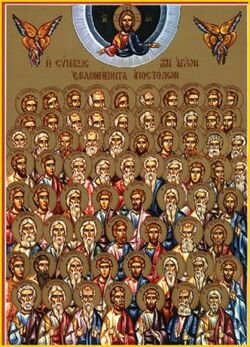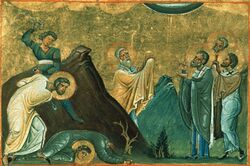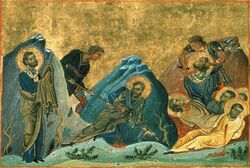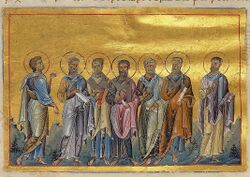Religion:Seventy disciples
Seventy disciples | |
|---|---|
 Icon of the Seventy Apostles | |
| Disciples | |
| Venerated in |
|
| Canonized | Pre-Congregation |
| Feast | 4 January (Eastern Orthodoxy) |
| Attributes | Scroll Cross |
The seventy disciples or seventy-two disciples, known in the Eastern Christian traditions as the seventy apostles or seventy-two apostles, were early emissaries of Jesus mentioned in the Gospel of Luke. The correct Greek terminology is evdomikonta (ἑβδομήκοντα) apostoli or evdomikonta mathetes.
According to the Gospel of Luke, the only gospel in which they appear, Jesus appointed them and sent them out in pairs on a specific mission which is detailed in the text. The number of those disciples varies between either 70 or 72 depending on the account.
In Western Christianity, they are usually referred to as disciples,[1] whereas in Eastern Christianity they are usually referred to as apostles.[2] Using the original Greek words, both titles are descriptive, as an apostle is one sent on a mission (the Greek uses the verb form: apesteilen) whereas a disciple is a student, but the two traditions differ on the scope of the words apostle and disciple.
The passage from Luke 10 reads (in Douay–Rheims Bible):[3]
And after these things the Lord appointed also other seventy-two: and he sent them two and two before his face into every city and place whither he himself was to come.
Analysis
This is the only mention of the group in the Bible. The number is seventy in some manuscripts of the Alexandrian (such as Codex Sinaiticus) and Caesarean text traditions but seventy-two in most other Alexandrian and Western texts. Samuel Dickey Gordon notes that they were sent out as thirty-five deputations of two each.[4]
The number may derive from the seventy nations of Genesis 10 or the many other occurrences of the number seventy in the Bible, or the seventy-two translators of the Septuagint from the Letter of Aristeas.[5] In translating the Vulgate, Jerome selected the reading of seventy-two.
The Gospel of Luke is not alone among the synoptic gospels in containing multiple episodes in which Jesus sends out his followers on missions. The first occasion (Luke 9:1–6) is closely based on the "limited commission" mission in Mark 6:6–13, which, however, recounts the sending out of the twelve apostles, rather than seventy, though with similar details. The parallels (also Matthew 9:35, Matthew 10:1, and Matthew 10:5–42) suggest a common origin in the hypothesized Q document. Luke also mentions the Great Commission to "all nations" (Luke 24:44–49) but in less detail than Matthew's account, and Mark 16:19–20 mentions the Dispersion of the Apostles.
What has been said to the seventy (two) in Luke 10:4 is referred in passing to the Twelve in Luke 22:35:
- He said to them, "When I sent you forth without a money bag or a sack or sandals, were you in need of anything?" "No, nothing", they replied.
Feast days
The feast day commemorating the seventy is known as the "Synaxis of the Seventy Apostles" in Eastern Orthodoxy, and is celebrated on January 4. Each of the seventy apostles also has individual commemorations scattered throughout the liturgical year (see Eastern Orthodox Church calendar).
Lists of the disciples' names
Attributed to Hippolytus
A Greek text titled On the Seventy Apostles of Christ is known from several manuscripts, the oldest in Codex Baroccianus 206, a ninth-century palimpsest lectionary.[6] The text is ancient, but its traditional ascription to Hippolytus of Rome is now considered dubious.[6] An 1886 translation is:[6]
- James the Lord's brother, bishop of Jerusalem
- Cleopas, bishop of Jerusalem
- Matthias, who supplied the vacant place in the number of the twelve apostles
- Thaddeus, who conveyed the epistle to Augarus (Abgar V)
- Ananias, who baptized Paul, and was bishop of Damascus
- Stephen, the first martyr
- Philip, who baptized the Ethiopian eunuch
- Prochorus, bishop of Nicomedia, who also was the first that departed, 11 believing together with his daughters
- Nicanor died when Stephen was martyred
- Timon, bishop of Bostra
- Parmenas, bishop of Soli.[lower-alpha 1]
- Nicolaus, bishop of Samaria
- Barnabas, bishop of Milan
- Mark the Evangelist, bishop of Alexandria
- Luke the Evangelist
- These two [Mark and Luke] belonged to the seventy disciples who were scattered by the offence of the word which Christ spoke, "Except a man eat my flesh, and drink my blood, he is not worthy of me." But the one being induced to return to the Lord by Peter's instrumentality, and the other by Paul's, they were honored to preach that Gospel on account of which they also suffered martyrdom, the one being burned, and the other being crucified on an olive tree.
- Silas, bishop of Corinth
- Silvanus, bishop of Thessalonica
- Crisces (Crescens), bishop of Carchedon in Galatia
- Epænetus, bishop of Carthage
- Andronicus, bishop of Pannonia
- Amplias, bishop of Odessus
- Urban, bishop of Macedonia
- Stachys, bishop of Byzantium
- Barnabas, bishop of Heraclea
- Phygellus, bishop of Ephesus. He was of the party also of Simon
- Hermogenes. He, too, was of the same mind with the former
- Demas, who also became a priest of idols
- Apelles, bishop of Smyrna
- Aristobulus, bishop of Britain
- Narcissus, bishop of Athens
- Herodion, bishop of Tarsus
- Agabus the prophet
- Rufus, bishop of Thebes
- Asyncritus, bishop of Hyrcania
- Phlegon, bishop of Marathon
- Hermes, bishop of Dalmatia
- Patrobulus, bishop of Puteoli
- Hermas, bishop of Philippopolis (Thrace)
- Linus, bishop of Rome
- Caius, bishop of Ephesus
- Philologus, bishop of Sinope
- Olympus and ...
- ...Rhodion were martyred in Rome
- Lucius, bishop of Laodicea in Syria
- Jason, bishop of Tarsus
- Sosipater, bishop of Iconium
- Tertius, bishop of Iconium
- Erastus, bishop of Paneas
- Quartus, bishop of Berytus
- Apollos, bishop of Cæsarea
- Cephas
- Sosthenes, bishop of Colophonia
- Tychicus, bishop of Colophonia
- Epaphroditus, bishop of Andriaca (there are at least two ancient towns called Andriaca, one in Thrace and one in Asia Minor),
- Cæsar, bishop of Dyrrachium
- Mark, cousin to Barnabas, bishop of Apollonia
- Justus, bishop of Eleutheropolis
- Artemas, bishop of Lystra
- Clement, bishop of Sardinia
- Onesiphorus, bishop of Corone
- Tychicus, bishop of Chalcedon
- Carpus, bishop of Berytus in Thrace
- Evodus, bishop of Antioch
- Aristarchus, bishop of Apamea
- Mark, who is also John, bishop of Bibloupolis
- Zenas, bishop of Diospolis
- Philemon, bishop of Gaza
- Aristarchus
- Pudes
- Trophimus, who was martyred along with Paul
Book of the Bee
Similar to an earlier list attributed to Irenaeus,[7] Bishop Solomon of Basra of the Church of the East in the 13th century Book of the Bee offers the following list:[8]
- James, the son of Joseph
- Simon the son of Cleopas
- Cleopas, his father
- Joses
- Simon
- Judah
- Barnabas
- Manaeus (?)
- Ananias, who baptised Paul
- Cephas, who preached at Antioch
- Joseph the senator
- Nicodemus the Archon
- Nathaniel the chief scribe
- Justus, that is Joseph, who is called Barshabbâ
- Silas
- Judah
- John, surnamed Mark
- Mnason, who received Paul
- Manaël, the foster-brother of Herod
- Simon called Niger
- Jason, who is (mentioned) in the Acts (of the apostles)
- Rufus
- Alexander
- Simon the Cyrenian, their father
- Lucius the Cyrenian
- Another Judah, who is mentioned in the Acts (of the apostles)
- Judah, who is called Simon
- Eurion (Orion) the splay-footed
- Thôrus (?)
- Thorîsus (?)
- Zabdon
- Zakron
- These are the seven who were chosen with Stephen:
- Philip the Evangelist, who had three daughters that used to prophesy
- Stephen
- Prochorus
- Nicanor
- Timon
- Parmenas
- Nicolaus, the Antiochian proselyte
- [the next three are listed with the preceding seven]
- Andronicus the Greek
- Titus
- Timothy
- These are the five who were with Peter in Rome:
- Hermas [of Philippopolis]
- Plîgtâ
- Patrobas
- Asyncritus
- Hermas [of Dalmatia]
- These are the six [sic; seven names follow] who came with Peter to Cornelius:
- Criscus (Crescens)
- Milichus
- Kîrîțôn (Crito)
- Simon
- Gaius, who received Paul
- Abrazon (?)
- Apollos
- These are the twelve who were rejected from among the seventy, as Judas Iscariot was from among the twelve, because they absolutely denied our Lord's divinity at the instigation of Cerinthus. Of these Luke [recte 1 John] said, They went out from us, but they were not of us;' and Paul called them 'false apostles and deceitful workers'.
- Simon
- Levi
- Bar-Ḳubbâ
- Cleon
- Hymenaeus
- Candarus
- Clithon (?)
- Demas
- Narcissus
- Slikîspus (?)
- Thaddaeus
- Mârûthâ
- In their stead there came in these:
- These are the twelve who were rejected from among the seventy, as Judas Iscariot was from among the twelve, because they absolutely denied our Lord's divinity at the instigation of Cerinthus. Of these Luke [recte 1 John] said, They went out from us, but they were not of us;' and Paul called them 'false apostles and deceitful workers'.
- Luke the physician
- Apollos the elect
- Ampelius
- Urbanus
- Stachys
- Popillius (or Publius)
- Aristobulus
- Stephen (not the Corinthian)
- Herodion the son of Narcissus
- Olympas
- Mark the Evangelist
- Addai
- Aggai
- Mâr Mârî
Others
Other lists are
- One attributed to Dorotheus of Tyre, completed some time before AD 811.[9]
- One attributed to Epiphanius of Salamis[10]
Matthias, who would later replace Judas Iscariot as one of the twelve apostles, is also often numbered among the seventy, since John Mark ("John, surnamed Mark", "Mark, who is also John") is typically identified with Mark the Evangelist.[11]
Some accounts of the legendary Saint Mantius of Évora regard him as one of the disciples, having witnessed the Last Supper and Pentecost.[12]
See also
Notes
- ↑ Soli has been variously identified as Soli, Cyprus and Soli, Cilicia.
References
- ↑ Catholic Encyclopedia: Disciple: "The disciples, in this disciples, in this context, are not the crowds of believers who flocked around Christ, but a smaller body of His followers. They are commonly identified with the seventy-two (seventy, according to the received Greek text, although several Greek manuscripts mention seventy-two, as does the Vulgate) referred to (Luke 10:1) as having been chosen by Jesus. The names of these disciples are given in several lists (Chronicon Paschale, and Pseudo-Dorotheus in Migne, P.G., XCII, 521–24, 543–45, 1061–65); but these lists are unfortunately worthless."
- ↑ "Synaxis of the Seventy Apostles". oca.org. http://ocafs.oca.org/FeastSaintsLife.asp?FSID=100017.
- ↑ Luke 10:1–21
- ↑ Gordon, S. D. (1906), Quiet Talks on Service, Project Gutenberg, accessed 15 January 2024
- ↑ Bruce Metzger, Textual Commentary on the Greek NT
- ↑ 6.0 6.1 6.2 Roberts, Alexander; Donaldson, James; Coxe, A. Cleveland, eds (1886). "Appendix to the Works of Hippolytus; containing Dubious and Spurious Pieces" (in en). The Ante-Nicene Fathers: Translations of the Writings of the Fathers Down to A. D. 325. V. translated by J. H. McMahon (American reprint of the Edinburgh ed.). Buffalo: Christian Literature Company. pp. –256. https://books.google.com/books?id=HjE8AAAAIAAJ&pg=PA255.
- ↑ Burke, Tony (25 February 2022). "List of Apostles and Disciples, by Pseudo-Irenaeus". North American Society for the Study of Christian Apocryphal Literature. https://www.nasscal.com/e-clavis-christian-apocrypha/list-of-apostles-and-disciples-by-pseudo-irenaeus/.
- ↑ Budge, Ernest A. Wallis, ed (1886). "Chapter XLIX; The Names of the Apostles in Order" (in en). The Book of the Bee: The Syriac Text Edited from the Manuscripts in London, Oxford, and Munich with an English Translation. Anecdota Oxoniensia: Semitic series. 2. Oxford: Clarendon Press. pp. 113–114. https://books.google.com/books?id=eJNJAAAAYAAJ&pg=PA113.
- ↑ Burke, Tony (February 2022). "List of the Apostles and Disciples, by Pseudo-Dorotheus of Tyre". North American Society for the Study of Christian Apocryphal Literature. https://www.nasscal.com/e-clavis-christian-apocrypha/list-of-the-apostles-and-disciples-by-pseudo-dorotheus-of-tyre/.
- ↑ Burke, Tony (January 2022). "List of the Apostles and Disciples by Pseudo-Epiphanius of Salamis". North American Society for the Study of Christian Apocryphal Literature. https://www.nasscal.com/e-clavis-christian-apocrypha/list-of-the-apostles-and-disciples-by-pseudo-epiphanius-of-salamis/.
- ↑
 Herbermann, Charles, ed (1913). "St. Matthias". Catholic Encyclopedia. New York: Robert Appleton Company.
Herbermann, Charles, ed (1913). "St. Matthias". Catholic Encyclopedia. New York: Robert Appleton Company.
- ↑ Cardoso, Jorge (1666) (in pt). Agiologio lusitano dos sanctos, e varoens illustres em virtude do Reino de Portugal, e suas conquistas. 3. Lisbon: Officina de António Craesbeeck de Mello. pp. 337–342. http://purl.pt/12169.
External links
- Luke 10 in Greek
- Luke 10 in Greek transliterated
- The Seventy Apostles
- The Book of the Bee, chapter XLIX "The names of the Apostles in order" by Solomon, Nestorian bishop of Basra, 13th century (edited by Ernest A. Wallace Budge, 1886)
- "Oldest Church" in Rihad Jordan Discovery "Ridiculous," Critics Say
 |





